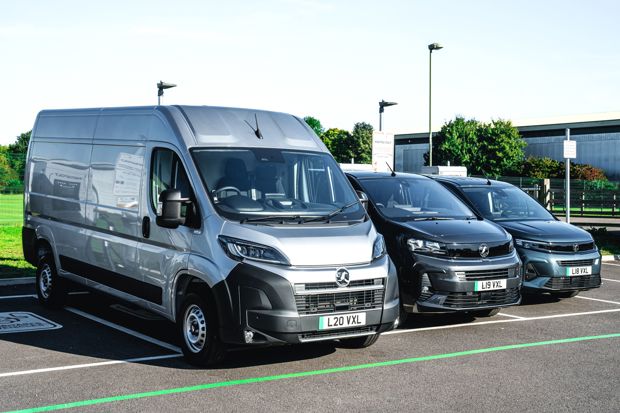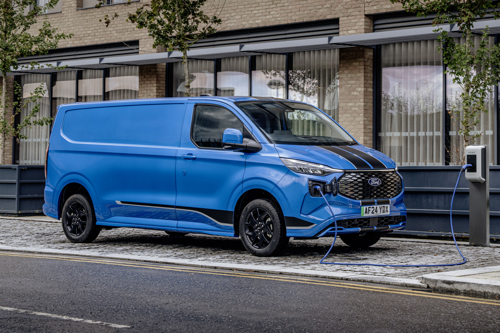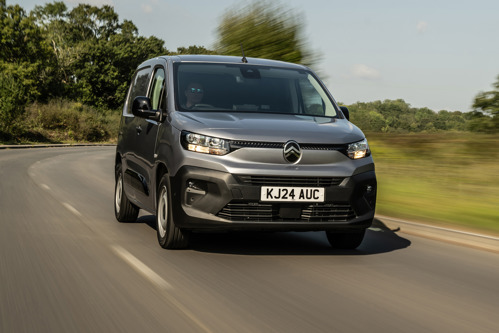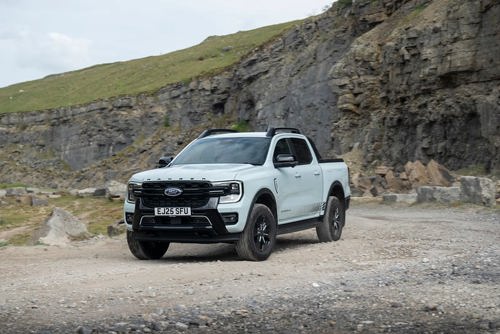Van finance: Your complete guide
Our van finance guide explains all the options when it comes to funding new and used commercial vehicles. Whether leasing or buying, our tips and advice will help you make the most informed decision for your next van.

How to choose the best van finance for you
If you’re looking to buy a brand new van or a used model that’s not very old, there’s a good chance that you will be looking for a finance package to purchase it with.
Choosing between those packages isn’t always easy, especially with the vast choice of finance options available. That’s where we come in.

In this guide we’ll look at the most popular types of van finance available and highlight what you need to consider about each so that you’re fully informed to decide which suits you and your business best.
Leasing versus buying
Whether leasing or buying a van is best for you and your business's needs is only something you can determine.
What we provide in this guide is clarity over the general advantages and disadvantages of both to help steer your your decision.
Ultimately, that knowledge is still at the mercy of temptingly low offers that may be available on the opposite pathway to the one you had decided to follow.
Pros and cons of leasing a van
One of van leasing's core attractions is that the management of the vehicle is usually performed by the company which supplied it, often with the maintenance package included. As the van isn't an asset owned by your business there's no associated cost consideration for its depreciation.
Leasing deals typically involve smaller up-front costs on lower ongoing payments than buying options. For VAT-registered businesses the monthly rental costs are partially allowable against your tax bill. Budgeting is usually easier when leasing because the only variable cost to consider is fuel.
Leasing can include stiff financial penalties if the van's mileage and condition at the end of the deal fall short of what you agreed to when you signed up.
Ending a leasing deal early can also prove tricky unless you're willing to stump up the cost of paying an exit fee, which could be especially difficult if your business is facing challenging circumstances.
Pros and cons of buying a van
When buying a van it becomes an asset of your business, meaning you can use and modify it as you see fit. Naturally, if it's purchased using some kind of finance package, technically it's not yours until the final payment has been made, so consider that if it needs to be returned.
That's the same case with mileage and overall condition, although the less appealing both are the faster your van will depreciate in value.
From a financial perspective buying outright means tax advantages, in that you can offset the capital allowances against tax if it used for business purposes only, as can the van’s running costs.
If you purchase the vehicle using a loan you can reclaim interest charges against tax and your own capital allowances even, if you are not VAT-registered.
Any issues with the van's operation will be the responsibility of you as its owner, even if the vehicle is still in its warranty period.
Depreciation isn't a hidden cost either, so be conscious of how it will be reported in your accounts. Even if the van is hardly used it will still lose value with age which you will feel when it's sold or traded in.
Buying outright requires a significant financial commitment, even if it is purchased using finance. A large deposit is frequently required, while balloon payments also require a substantial sum. Being left out of pocket due to theft or accident damage is a real prospect if you decided to scrimp on GAP insurance.
Van finance options
Regardless of the size of the enterprise, few businesses have sufficient funds sloshing around in their cashflow to enable them to purchase a van outright, making finance of one kind or another an operational necessity.

Below we explore the main finance options available and highlight key considerations to bear in mind for choosing the right one for you:
Finance Lease
Leasing is something of a catch-all term for what's essentially long-term van rental, the notion being agreements either last far longer than other forms of commercial vehicle funding or are for shorter durations but intended to be repeated on a rolling basis. These are known as Finance Lease deals.
Management of the van is usually the sole responsibility of the company supplying it. Finance Lease deals are usually inclusive of maintenance, meaning it's a cost you can avoid, plus as the van's not your or your business's asset there's no need to factor depreciation into your accounts.
Finance Leasing typically means a low initial payment than other forms of finance, further reducing expenditure before the van's operational. The monthly instalments are also allowable against tax for VAT-registered firms, further comparing favourably in cost terms against an outright purchase. You also benefit from a set monthly amount which covers everything except fuel, useful from a budgeting perspective.
Finance Leasing also allows larger firms that require multiple vans for more substantial fleets to budget easily as the monthly payments will remain constant for long periods of time. Agreements aren't directly tied to specific vehicles, as they will be returned and replaced as they reach a pre-agreed age.
Important points about Finance Lease
- If you fail to abide by the leasing deal's terms and conditions you're likely to face financial penalties. While these terms usually include references to mileage and condition, the suppling firms take a more realistic view of how the vans will be used and factor that in to the overall agreement cost. Going beyond those parameters could prove costly.
- Unless you pay an exit fee you are usually tied to the Finance Lease for a long time period. That could prove tricky if your circumstances change or you no longer need the van you're leasing, meaning there will be a cost involved to change the situation.
Contract Hire
Contract Hire agreements are similar to leasing in general in that it's a rental rather than ownership model, but the deal is for a specific van over a set period of time, typically one to five years.
Such deals usually require only a small initial outlay, frequently equivalent to a month’s rental. This makes it an attractive option for smaller business or those seeking to avoid large financial commitments or without much accessible capital available.
There's also a degree of flexibility compared with conventional leasing in that the fleet size can be increased or decreased relatively easily, particularly with short-term contract hire agreements, allowing firms to accommodate workload fluctuations.
As with other forms of leasing, maintenance is usally part of Personal Contract Hire (PCH) and Business Contract Hire (BCH) deals, leaving fuel as the only variable cost each month, plus as you won't own the van there's no depreciation cost to factor into your accounts. Monthly payments made on a Contract Hire agreement are also allowable against tax.
Important points about Contract Hire
- Contract Hire deals have mileage limits for the period of the deal with an overcharge for each mile over the pre-agreed limit applied when it's handed back. Carefully consider how many miles you'll need the van to cover before signing for a cheaper-sounding deal.
- A van obtained via Contract Hire must be returned in good condition, save for taking into account fair wear and tear. Damage over and above this will result in further financial penalties.
Loans
Alternative van financing methods have reduced the popularity of loans but they can still prove to be an attractive way to fund a commercial vehicle.
There are scores of lenders aside from traditional high street banks, with increased competition being good news. Factor in the proliferation of price comparison sites and within a few minutes you're able to compare a variety of loan packages, making it so much easier to spot the best deal.
As van dealerships generate chunky revenues from finance packages and their bolt-on extras, there’s little incentive for them to discount simply because you have the money immediately available. That advantage it does present is that you can make a deal quickly — spot the right van for you and it could be yours in minutes while another would-be customer is applying for finance before awaiting an approval decision.
Another clear advantage in a loan's favour is that dealer-supplied finance packages mean the van won't belong to you or your business until the instalments are paid in full. This can cause issues if it's written-off or stolen, as well as if problems arise for the finance company or your own business. Purchasing a van with a loan ensures it's immediately your property, enabling it to be sold to raise funds should the worst happen.
Important points about loans
- One key disadvantage to loads is that they are debts associated with your business. While the puchased van is an asset, such is the level of depreciation that it's unlikely to be worth more than the outstanding balance for at least a couple of years.
- Similarly, if the van was written-off or stolen any insurance payout would likely be significantly less than the outstanding loan balance, unless you have Guaranteed Asset Protection (GAP) insurance.
- While a loan results in a fixed repayment cost each month, all other van-related expenditure must be dealt with separately. Maintenance, consumables, repairs and fuel all have to be paid for, varying dependent on how often the van is used. Failure to maintain it properly will negatively impact its residual value and increase the risk of breakdowns and time off the road.
- Loans for more expensive vans may be unavailable to all businesses. Larger, higher-specification models can easily exceed £40,000 — if your business is young, small or recovering from a tough financial episode, a loan of that size may be completely out of the question or only available with high interest rates.
Hire Purchase
Despite the name suggesting otherwise, Hire Purchase — HP for short — is not a rental agreement but a form of credit that enables you to buy a van outright.
Paying back a set amount each month, typically over a three- to five-year period, most HP agreements require a deposit to be paid up front. The higher the amount of deposit that's paid, the remaining balance is reduced resulting in lower monthly instalments.
As HP deals work on the premise that you will ultimately own the van and be able to log it as a business asset, they can prove advantageous for users who need to cover high annual mileages or where keeping the van in a good cosmetic condition are likely to prove difficult.
Important points about Hire Purchase
- If you are unable to keep up with your monthly instalments the van will be repossessed by the lender. At this point you will also be liable for any remedial work it requires to return it to a saleable condition.
- While HP deals ensure you can record the van as a business asset, it will depreciate in time, making it less valuable with each year its owned.
- Monthly payments for HP deals are typically higher than most other forms of finance and you'll need to good credit score in order to benefit from a lower APR rate on them.
- If the van breaks down outside of its warranty period but your HP agreement is still ongoing, it’s your responsibility to have it fixed.
Personal Contract Purchase
Personal Contract Purchase (PCP) agreements involve paying a deposit followed by monthly instalments over a set period, typically over three to five years. Those monthlies are usually lower than they would be if the van was purchased using HP because rather than the cost of the whole van — plus interest — you’re essentially financing its depreciation over the duration of the deal.
How much it loses in value is determined by the Guaranteed Minimum Future Value (GMFV) figure you are given when sorting out the agreement. If the van costs £40,000 new and the GMFV figure after three years is £18,000, your PCP deal is financing that £22,000 difference, plus interest charges.
At the end of your finance term you can either hand the van back and walk away, buy it outright for the GMFV figure or start a PCP deal on a new van, using any equity in your old one towards your deposit.
Important points about PCPs
- As with Contract Hire agreements, PCP deals include mileage limit and condition stipulations. Fall foul of those and you could be facing some heft bills, although most van dealers are inclined to be lenient on those points if you remain with them and take out a new PCP.
- Getting out of a PCP agreement early can prove difficult should your circumstances change, almost always requiring the balance of deal being paid off.
- The van can't be logged as a business asset unless the GMFV figure is paid at the end of the deal.
Lease Purchase
Lease Purchase deals aren't especially commonplace but one could prove attractive for businesses that wish to own the van outright, albeit with lower monthly instalments in the first few years of the agreement than are typical when buying on HP.
There are structural similarities between Leasing Purchasing and PCPs in that both comprise three sections — an initial deposit, monthly payments and a final balloon payment. The key difference is that third stage.
While a PCP's balloon payment is determined by the GMFV amount, with a Lease Purchase it's negotiated at the start of the deal and is individual to each agreement.
PCPs also have mechanisms to hand the van back or take out a new agreement, neither of which are components of Lease Purchasing — here the van has to be bought outright, so what you're essentially doing is deferring a large proportion of its cost to the end.
Important points about Lease Purchase
- As there's no GMFV figure, the van's final balloon payment could be higher than its actual resale value but with no option to walk away from the agreement.
- Budgeting for Lease Purchase deals can be tricky as you will ideally need to set aside enough to cover the remaining balloon payment and clear the balance. If you don't you might need to take out a loan to cover the shortfall, further extending the period of debt on the van.
Don't forget about VAT
If you’re buying a new van or pickup for your businesses then it’s important to understand how Value Added Tax (VAT) rules work. Doing so could potentially save you thousands on the list price and monthly payments of your new commercial vehicle. Doing the opposite will likely prove expensive.
Many van deals and offers are advertised at prices excluding VAT, which means you may end up paying more than the headline figures suggest. VAT-registered businesses can reclaim the tax paid on vans and pickups, but how much you claim will depend on the usage of the vehicle.

A van that is used for business purposes for 50% of its journeys can only have that same percentage of the VAT reclaimed. You can also claim the VAT on leased commercial vehicles, subject to the same conditions.
5 things to do before signing the deal
As exciting as it is leasing or buying a new van, it's still important to have a clear mind to check these five points before you put pen to paper on a financial agreement:
- Know how much you will pay overall — It’s easy to focus on the monthly payments, but how much will you actually pay in total? Sit down and examine all of the costs, including any arrangement fees, to see exactly how much the van will cost you. If you are taking out a bank loan, ask about whether the interest rates are fixed for the life of the contact otherwise they could increase without warning.
- Know how much the excess mileage charges are — Never agree to a vehicle financial agreement without check the mileage limitations first. Some of the cheapest deals, with the most tempting monthly fees, will have the lowest annual mileage limits, which may not suit your business's needs? Always check the small print because excess mileage charges can easily result in higher costs after the event than agreeing to a higher mileage cap at the start of your agreement.
- Know what's included in the service agreement — There is a difference between a service and full maintenance agreement. The former only covers for the intermittent service as and when required and may not cover other wear and tear, such as replacement brake discs or tyres.
- Ensure you are in possession of the full terms of your agreement, including conditions and potential penalties — A dishonest salesperson might gloss over many of the important small print items that could leave you out of pocket. For example, what happens if your circumstances change and you need to leave the leasing agreement early? Always demand full documentation so you can prepare for every eventuality and if there's a reluctance to provide them then walk away.
- Ensure you have clarification of the finance company's definition of fair wear and tear — Financial contracts will have a ‘fair wear and tear’ policy, which will outline what penalties will be enforced against what is considered to be unreasonable damage to the vehicle. Ask to see these terms and conditions. Some finance provers will accept scuffed paintwork in the van’s load area and paint scratches, while others might demand £500 to rectify them.
If you think you've been mis-sold van finance...
The basis for claiming a financial product has been mis-sold to you is fundamentally the same regardless of what can of deal was agreed to.
What's key to a potential mis-selling case is whether you were sold a product that wasn't suitable for you and your circumstances, that the risks were not explained to you or that you were given the wrong advice.
Remember that the issue must be with the financial product and not the van or pickup its funded.
- Depending on the nature of the product you may have a 30-day cooling off period. Check all your paperwork carefully to see if this is the case and make contact with the finance provider as soon as possible. If you have purchased finance through a dealership it is highly likely the finance itself will have been provided by a third party, and it is this company you will need to contact if you wish to cancel.
- If you are outside of the 30-day period and you believe you have been mis-sold a financial product you must make a complaint to the provider as soon as possible. Go through all of your paperwork carefully and any communication you have with the provider, particularly if anything relates to provided information you feel was misleading. If relevant conversations were conducted over the phone, try and note down dates, times and ideally names of who you spoke to as recorded conversations could be recovered.
- Gather your information together and write to the dealer principal if your complaint is with the retailer or to the complaints department if it is a financial institution. The latter has to provide you with a copy of their complaints procedure if you request it. State your case clearly, concisely and calmly — accusatory or emotional statements are more likely to get a defensive response — and send your complaint by recorded post as a signature proves it was received and a response is required by law.
- If you are unsatisfied with the response you can approach Citizens Advice and they may be able to look at your case and advise on the next steps to take. Alternatively you can escalate the complaint by taking your case to the Financial Ombudsman Service, a body set up by the government with the power to investigate a whole range of financial products.
If you can no longer afford the payments...
You may have been happy with your van and the financial arrangement when you took it out, but it may be that you are now having problems keeping up with the payments. This could be for any number of reasons, such as a hold-up in cash flow, a loss of clients or just a quiet period for your business. Regardless of the reason it is important to take action to avoid negative consequences.
If you know you cannot afford an upcoming payment then contact your finance provider as soon as possible. If you explain your circumstances and can say when you will be able to make the payment it should avoid any missed payment letters being automatically generated and may also mean you can avoid late payment fees being added on top.
- Whatever the circumstances, contacting the company that provided the finance and keeping them informed is essential. If you fail to do so, it is only a matter of time before the vehicle is repossessed — this will hurt your company’s credit rating and leave you without a van.
- If you arranged a loan to buy the vehicle then the solution is relatively simple, as you can sell it and use the money to clear some or all of the remaining loan. Obtain a settlement figure from the finance company to know exactly how much is required to pay off the loan in one go.
- If you have a Hire Purchase or PCP agreement on your van it's more complicated. If you have paid at least 50% of the total amount owed when you first bought the vehicle — this total will be in your documentation — then you have the right to return the vehicle under voluntary termination. You can do this and owe nothing more and without damaging your credit rating, although this option may make it more difficult to obtain finance in the future. The vehicle must be in good condition for you to take advantage of this option.
- If voluntary termination is not an option you should contact the finance company and explain that you are experiencing financial difficulties. Depending on your circumstances and how they may change in the future, they may be able to help with a payment plan or even rearrange your finance with a new agreement over a longer term to reduce the monthly payments.
- Another alternative is to take out a loan to settle the agreement so you will own the vehicle outright. This may give you the breathing space so that you can keep your van operational.
If you need to return a faulty vehicle...
Your rights are against the dealer and the finance company jointly if you bought it on finance, but not against the van manufacturer.
The Consumer Rights Act 2015 theoretically gives you the statutory right to reject a new or used van within the first 30 days of purchase if any fault is found. Most of the Consumer Rights Act 2015 applies to business-to-business sales but you do not get an automatic right to a refund.
- The best advice is to try to settle the matter without getting legal. Once a dealer knows you know your legal rights he’s more likely to settle, as long as you are being reasonable. If the van is on finance you can take the matter up with the finance company.
- Write to both the dealer principal and to the finance company and send your letter by Post Office Special Delivery so you get receipts for them and your letters become 'matters of record' which can't be denied.
- Remember, taking the dealer to court should be you last resort. If both the dealer and finance company refuse to accept your rejection of the van, you can't continue to use it while taking court action against them. That means your vehicle could be sat for weeks and you’ll need to source a replacement until the matter is resolved.
Ask Honest John Vans for help
That’s right, we’re here to help.
Complete the minute-long registration process to get full access to Honest John Vans’ team of experts.
Can I get out of a leasing contract early?

I plan to do 30,000 + miles per year - should I buy or lease a van?

